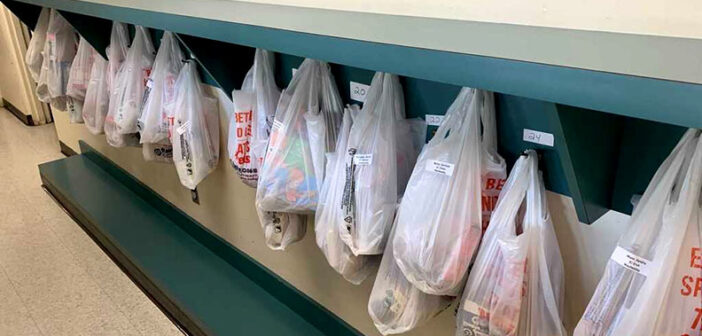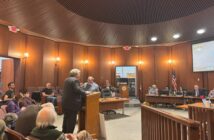As a result of COVID-19, South Bethlehem has seen increasingly large numbers of families who lack consistent access to food. To help those in need, various food pantries have been working hard to lessen the stress that comes with Bethlehem’s prevalent issue of food insecurity.
Located on East 4th Street, the Hispanic Center Lehigh Valley’s food pantry first opened in 2012 and has since turned their once empty basement into a crucial food resource for many locals.
While local food insecurity has been a consistently prevalent issue historically, the pantry has seen numbers skyrocket in the past year.
According to Donna Taggart, the president of the Hispanic Center Lehigh Valley’s board of directors, in the fiscal year of July 1, 2018, to June 30, 2019, the food pantry had 794 visitors.
One fiscal year later, in 2020 and just three months into the pandemic, the Hispanic Center Lehigh Valley saw a jarring 219 percent increase in numbers— totaling 2530 visitors.
Now, almost halfway through the 2020-2021 fiscal year, the Hispanic Center has seen 1,414 visitors, a number projected to surpass last year’s increase.
“I wish that I could see our numbers go down,” Taggart said. “The pantry is supposed to be a safety measure, and yet look at the numbers… usually when your numbers go up that’s a success, but I don’t look at it that way.”
While increasing numbers serve as a sign of worsening food insecurity, locals are welcome to the pantry’s services when in need.
In particular, the pantry specifically caters to those who qualify by income range, along with their location— residents of the 18015 and 18020 zip codes are eligible, along with the entirety of the Northampton County due to the pantry’s partnership with Second Harvest of the Lehigh Valley.
As a food bank, Second Harvest provides food for the Hispanic Center Lehigh Valley food pantry once a month. The Center also partners with Sam’s Club, where they go every Friday to pick up any meat, produce, baked goods or other items that could be of use.
While the center used to operate on a fixed schedule where visitors could pick out their own supplies, the pantry now functions on an appointment basis where those in need can pick up a three-day supply of prepared packages.
Many of their visitors include those that have been hit hard by the pandemic—those that lost their jobs and are struggling to make ends meet in terms of necessities such as housing and putting food on the table.
“They have to make a choice of paying their rent or buying food… it’s just a choice nobody should have to make, but I’m glad that we’re able to be there and help,” Taggart said.
In addition to the Hispanic Center Lehigh Valley food pantry, various community schools around Bethlehem offer their students and families resources to fight food insecurity as well.
According toAlicia Creazzo, Broughal Middle School’s community school coordinator, before the pandemic, over 90 percent of Broughal students received a free or reduced lunch—an opportunity that many relied on to receive guaranteed meals every school day.
While the district quickly put a meal program in place where families could come to their schools to pick up their food, many were still unable to make ends meet on the weekends. As a result, Broughal Middle School created an on-site emergency food pantry.
“We were trying to make sure that our families knew that we were still there for them and they could come and get food or reach out if they needed anything, but food access was and still is a need for our families right now,” Creazzo said.
In addition to the emergency food pantry, Broughal Middle School partners with Backpack Pals Bethlehem, in which schools give out backpacks with food supplies to food insecure families on long weekends and as needed.
Similar to Broughal, Fountain Hill Elementary School has been running a weekly food distribution program called Backpack Buddies for 15 years, averaging to about 30 to 35 families who receive a supplemental pantry weekly.
“We aim to provide at least one family dinner, several lunches and kid-friendly snacks through each bag, so there is a format that we try to follow, but sometimes we’re at the mercy of what kind of food we just happen to have,” Paige Hoffman, Fountain Hill Elementary School community school coordinator, said.
With COVID-19 cases continuing, the program has experienced changes in terms of how food is distributed and who is receiving it.
Backpacks have been switched to plastic bags to mitigate the risk of spreading germs, while students who have taken classes virtually appear less frequently to pick up their food.
“I always wish we could do more, give more, serve more—that’s always in the back of our heads,” Hoffman said.
On the NorthSide of Bethlehem, efforts are just as strong.
Cesar Cordova, Community School Coordinator of Marvine Elementary School, oversees their on-site Second Harvest-supported food pantry.
Three days after the elementary school closed last March, Cordova and his colleagues decided to keep their food pantry open, knowing that families would be looking for sufficient access to food.
Every Friday, Marvine Elementary School runs a bag program from their food pantry aimed at supporting not only their students, but their entire families as well.
“What if they have siblings?” Cordova said. “What if they have brothers, sisters or they need to live with a cousin? Using that approach, we try to provide something bigger, like a grocery bag, to take home for the weekend.”
Pre-bagged items are placed outside for people to pick up. These bags usually consist of anything one could find in a grocery store: canned food, pastas, meat, milk, eggs, cheese, and more—even toiletries and cleaning supplies.
This past year, the Marvine Elementary School food pantry saw more than just its own students coming for help. Students from all over Bethlehem have sought help, making Marvine Elementary School’s food pantry one of the busiest in the area.
For many families in Bethlehem, food is not always guaranteed. While food pantries do their best to provide for those in need, much of the time they rely on the community to make donations.
To find the community school’s most needed food items, visit Fountain Hill’s, Broughal’s, and Donegan’s Amazon Wish Lists, or contact Cesar Cordova and visit the HCLV’s website to learn more about how to donate to their organizations.
“Food is something that when you have it, it’s easy to take it for granted,” Hoffman said. “But for a lot of families in our community, it’s not a given. It’s got to take a community to rally on behalf of those who need it and I hope that’s what will happen.”






Comment policy
Comments posted to The Brown and White website are reviewed by a moderator before being approved. Incendiary speech or harassing language, including comments targeted at individuals, may be deemed unacceptable and not published. Spam and other soliciting will also be declined.
The Brown and White also reserves the right to not publish entirely anonymous comments.